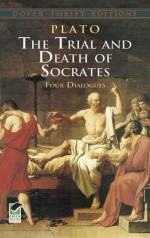|
This section contains 850 words (approx. 3 pages at 400 words per page) |

|
The Nature of Wisdom
Essentially, the "Dialogues" exist because of Socrates' theories about the nature of wisdom, theories he acts upon (to varying degrees) in each dialogue and which therefore form a thematic spine for all four. Perhaps the most important of these is his theory about his own personal wisdom, which he claims is in fact ignorance. Through proclaiming that he has no wisdom of his own (in spite of his reputation for being among the wisest of men), and through acting on that belief by examining and questioning the so-called "knowledge" of others, Socrates suggests that true wisdom lies in knowing what one doesn't know - and in knowing that one doesn't know. Then, through his repeated, extremely specific questioning of Euthyphro, Meletus, Simmias and Cebes (among others), he demonstrates that this sort of wisdom can be gained through genuine, honest examination of thought and belief. In...
|
This section contains 850 words (approx. 3 pages at 400 words per page) |

|




